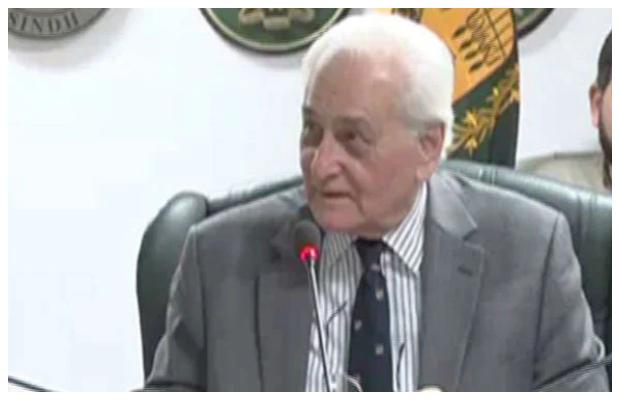F.P. Report
PESHAWAR: Caretaker Chief Minister Khyber Pakhtunkhwa, Muhammad Azam Khan has said that the caretaker government will keep itself restricted to its constitutional and legal role and remain apolitical, impartial and will perform its duties without any sort of political affiliation.
He expressed these views while presiding over the 9th meeting of the Khyber Pakhtunkhwa caretaker cabinet here on Wednesday. Besides caretaker cabinet members, the meeting was attended by Chief Secretary Nadeem Aslam Chaudhry and concerned administrative secretaries. In his address to the participants of the meeting, the Chief Minister welcomed the new cabinet members.
The chief minister said that the role, responsibilities, and dos and don’ts of the caretaker setup is very much clear in the relevant provisions of the constitution and Election Commission Act 2017. Azam Khan remarked that the caretaker government of Khyber Pakhtunkhwa is faced with two major challenges: law and order and financial crunch, and continued that improvement of the prevailing law and order situation would be the top priority of government and pledged to make all-out efforts to this end.
He said that the province is largely dependent on the federal government, with regard to its revenue, and more than 90 percent of its revenue comes from various federal receipts and added that after the merger of ex-FATA, the population of the province has increased, and as per the existing population ratio, the NFC shares of the province has climbed to 19 percent of the federal divisible pool, but unfortunately, it is getting only 14.6 percent.
The Chief Minister remarked that at the time of the ex-FATA merger, it was committed by all the federating entities that three percent of their NFC share would be provided for the newly merged districts, whereas it was also pledged that Rs. 100 billion would be provided to Khyber Pakhtunkhwa every year for the accelerated development of the NMDs, but during the last five years, only 103 billion has been provided to the province out of the total 500 billion.
Touching upon the issue of net hydel profit, the Chief Minister said that as per the AGN Qazi formula, Rs. 1200 billion in dues are pending against the federal government, adding that in the given scenario, fast-track uplift of the newly merged districts has become very difficult. Azam Khan informed the new cabinet members that he had already taken up all such issues with the previous federal government for redress and directed the caretaker finance minister to follow up on those cases with the caretaker federal government.
Highlighting the priorities of his government, the chief minister reiterated that his government will focus special attention on merit, transparency, and good governance in its day-to-day business, adding that the administrative secretaries of the provincial government has already been directed to take the necessary steps to this end. He urged the administrative secretaries to give honest and sincere advice to their concerned ministers with regard to the official business of the department. He further directed the cabinet members and administrative secretaries to identify corruption cases, if any, in their respective departments and initiate appropriate actions against those involved.
The agenda for the meeting encompassed seven key points, notably the approval of project revisions, the establishment of a forensic science laboratory at Peshawar, the nomination of an administrative judge for anti-terrorism courts, and fixing matters relating to the Police Public School teachers’ case in court.
The meeting’s deliberations encompassed the approval of supplementary funding for the Forensic Science Laboratory in Peshawar and revisions to PC1 for the Janikhel Bannu Police Station. These measures are anticipated to contribute significantly to counterterrorism efforts and the maintenance of law and order in Khyber Pakhtunkhwa. Furthermore, the cabinet approved the nomination of Senior Judge Justice Ishtiaq Ibrahim Khan as an administrative judge for anti-terrorism courts, a recommendation put forth by the Chief Justice of the Peshawar High Court.
The cabinet also decided to forward the PC-I for the Women and Children Liaquat Memorial Teaching Hospital in Kohat and the National Programme for Improvement of Water Courses in Pakistan, Phase-II projects to the Provincial Development Working Party (PDWP) for reassessment. During the meeting, a sub-committee led by the senior member of the Board of Revenue, was formed to address service rules pertaining to the Provincial Ombudsman office’s employees.
The recommendations of a committee formed to address the concerns of police public school teachers were presented and subsequently endorsed by the cabinet. A committee, headed by Caretaker Provincial Minister Syed Masood Shah was also formed to oversee the implementation of these recommendations.







